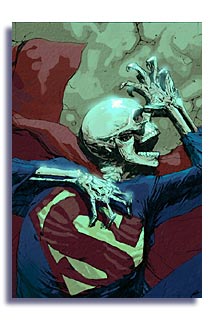Oh, cripes. If Hollywood had any idea what it was doing
with the Superman franchise, the powers that be would drop-kick
McG and turn a screenwriter loose on the storyline laid
out here. (It would be too much to hope that Waid himself
would get the assignment.) Birthright isn't just
retelling the early days of Superman for a new (and old)
audience, it's firmly positioning The Last Son of Krypton
as the first among heroes in a way that nobody has really
made click in the modern age.
It helps that no other heroes have been involved. This
story is about Superman and his supporting cast alone. Thank
goodness, because it always gets a little sticky to have
people worried about this alien when you've had the Martian
Manhunter running around for decades. (Granted, J'onn J'onnz
has most likely been in disguise for most of his time on
Earth, but still…)
If you severely condense the first four issues or so,
you have the outline for a great movie. Waid has re-introduced
and to some extent redefined every character you think you
know without necessarily jettisoning all their continuity
baggage.
The
character most toyed with, perhaps, is Lex Luthor, and yet
all Waid has done is stripped him to the core while picking
and choosing from all the different Luthors the media has
given us. As in Smallville
and pre-Crisis, Lex and Clark were friends in their youth.
But losing his hair was not the thing that drove him into
what we consider evil; at his heart, Luthor's tragic flaw
is an arrogance and loneliness that prevents him from connecting
with humanity. Though on some level he may realize he just
wants to be loved (is that so wrong?), Luthor cannot see
that he has made himself unlovable. Charming, perhaps, in
the right situation, but unlovable.
And so that flaw spurs him on to trying to dominate humanity,
which would have succeeded financially if not for that meddling
Kryptonian.
Luthor has done the only logical thing: faked an invasion
from Krypton. In a cool tweak to the origin, Waid has also
made Luthor the one privy to Superman's origins, not Superman
himself. Over in Superman/Batman, Jeph Loeb used
a similar invasion scheme, but that was more for bombastic
action and an excuse to reintroduce Supergirl; here, Waid
uses it to highlight characterization and the forging of
a hero.
Until this invasion, Superman has had setbacks. But this,
even though he knows it cannot be real, shakes his fledgling
confidence. (And what a magnificent third act it makes.)
Some of the Planet staffers don't know which way to side,
but the public has made up its mind: Superman is against
us. Waid has shown it bubbling for a couple of issues now,
and it explodes here. Clark Kent hides while changing to
Superman, not just because his identity must remain secret.
The way Yu and Alanguilan stage it, there's clearly a strange
element of shame to the whole thing.
Their art continues to be incredible. Let me not say "forget
about Jim Lee," but really, this team should pose
a threat to Lee's dominance. They have subtly aged Clark
Kent over these past ten issues, and as artists really know
how to act the emotion of Waid's scenes.
If that's not enough, the last three pages of this book
should stand as iconic representations of the character.
There's a palpable shift from Clark to Superman, so good
you can hear the horns playing John Williams' theme in the
background.
Oh, please, Warner Brothers - read this book. More importantly,
understand it. If it means Mark Waid has to start billing
himself as McWaid, so be it. Birthright is what Superman
is all about.






